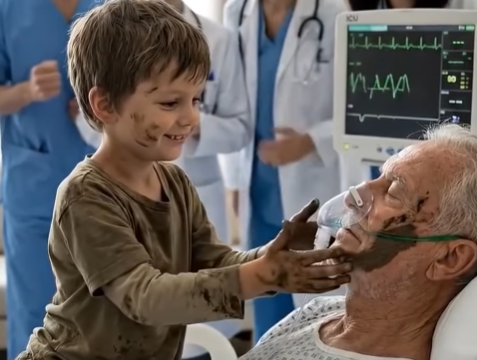What began as a calm afternoon at a Walmart in Marion County, Florida, erupted into chaos when a woman entered the store clutching a brick and behaving erratically. Within minutes, the shopping aisles turned into a scene of panic and fear as the woman began waving a knife, shouting incoherently, and alarming everyone in sight. What could have been a peaceful day of errands quickly transformed into a high-tension encounter that has since sparked public discussion about addiction, mental health, and safety in everyday spaces.

On Thursday afternoon, the Marion County Sheriff’s Office received multiple frantic 911 calls from shoppers at the Summerfield Walmart. The callers reported a woman inside the store acting violently, holding a knife, and threatening customers. Deputies Christopher Witte and Detective Pamela Thomas were the first to respond. As they entered the store, they found the suspect — later identified as 33-year-old Brandy McGowan — in the clothing section, gripping a pocket knife in one hand and a brick in the other. According to the incident report, McGowan appeared extremely agitated, pacing back and forth while muttering incomprehensible words.
Bodycam footage released by the sheriff’s office paints a tense and unnerving picture of the encounter. McGowan, her movements erratic and her voice trembling between shouting and crying, refused multiple verbal commands from Deputy Witte to drop the knife. Witte, maintaining a safe distance, repeatedly warned her that he would be forced to use a Taser if she didn’t comply. Even as customers were escorted to safety by Walmart employees, McGowan’s unpredictable behavior created a volatile situation that could have turned tragic at any moment.
When repeated warnings went ignored, Deputy Witte deployed his Taser. The electric charge temporarily incapacitated McGowan, allowing deputies to move in swiftly and restrain her without any injuries to officers or bystanders. Once handcuffed, she was evaluated at the scene and later transported for medical assessment and booking. Authorities later confirmed that she was under the influence of methamphetamine, having reportedly consumed around four grams earlier that day — an amount experts say is enough to cause severe paranoia, delusion, and erratic behavior.
Witnesses described the scene as terrifying. One shopper said, “It all happened so fast. One minute she was yelling nonsense, the next she had a knife in her hand. Everyone was running in different directions — people just wanted to get out.” Employees acted quickly, locking down sections of the store and guiding customers to exits until law enforcement arrived. Though no one was physically hurt, the emotional impact on those present was undeniable.
Investigators determined that McGowan had walked into the store already carrying a brick. Once inside, she allegedly took a pocket knife from a display case, used a pair of scissors to cut open the packaging, and began waving the blade erratically. Witnesses told deputies that she seemed disoriented and agitated, shouting random words and making no coherent demands. Her unpredictable actions created immediate panic, forcing some customers to hide behind aisles or flee the store altogether.
Authorities said that McGowan’s behavior was consistent with severe methamphetamine intoxication — a condition that can trigger paranoia, confusion, and hallucinations. Deputies noted that her speech was slurred, her movements unstable, and her emotions wildly fluctuated between anger and distress. After her arrest, McGowan was charged with multiple counts, including assault with a deadly weapon and disorderly conduct. She will also undergo a psychological evaluation to determine the extent of her impairment during the incident.
While the bodycam footage shows a frightening moment, it also captures the professionalism and restraint of the responding deputies. Despite facing a potentially lethal threat, they managed to de-escalate the situation without resorting to deadly force. Sheriff’s officials commended Deputies Witte and Thomas for their composure, quick thinking, and adherence to safety protocols. Their actions prevented what could have easily become a tragedy inside a crowded public space.
The video has since gone viral, sparking renewed discussions about how law enforcement and communities handle situations involving individuals under the influence of drugs or experiencing mental health crises. Social media reactions have been divided — some praising the deputies for their calm response, while others express concern about the growing number of similar incidents nationwide. Many pointed out that retail stores, often open and accessible, have become unexpected frontlines for mental health emergencies and drug-related episodes.
Public health experts have also weighed in, using the Florida Walmart incident as a sobering reminder of the ongoing challenges posed by methamphetamine abuse. “This is not just a policing issue,” one addiction counselor noted. “It’s a public health crisis. People are self-medicating deep mental and emotional pain with dangerous substances, and the results can be catastrophic — not only for them but for the community around them.”
Although no one was physically injured, the event left behind lingering emotional distress and renewed calls for community-based prevention programs. Many argue that better access to addiction treatment, mental health care, and early intervention could help prevent dangerous encounters like this from ever happening. Walmart, for its part, confirmed it is cooperating with law enforcement and reviewing its safety procedures to ensure employees are better prepared for emergencies.
As McGowan awaits trial and medical evaluation, her story highlights a troubling reality: behind every public outburst lies a deeper struggle, often fueled by addiction and untreated mental illness. The Florida incident underscores how quickly an ordinary day can spiral out of control — and how essential it is for society to respond with both accountability and compassion.
In the end, the deputies’ quick action likely saved lives that day. Their ability to defuse an incredibly volatile situation without harm stands as an example of effective crisis intervention. Yet the broader questions remain — what drives individuals to such desperate states, and what can be done to stop it before another public place becomes the stage for chaos and fear?
This unsettling episode at a Florida Walmart serves as both a cautionary tale and a call to action. It reminds us that beneath every headline about disorder and danger, there is often a human being in need of help long before the moment of crisis. Preventing such incidents will require more than quick reflexes — it will demand understanding, resources, and a collective effort to address the root causes of addiction and mental health struggles that continue to unfold under the harsh fluorescent lights of everyday life.





